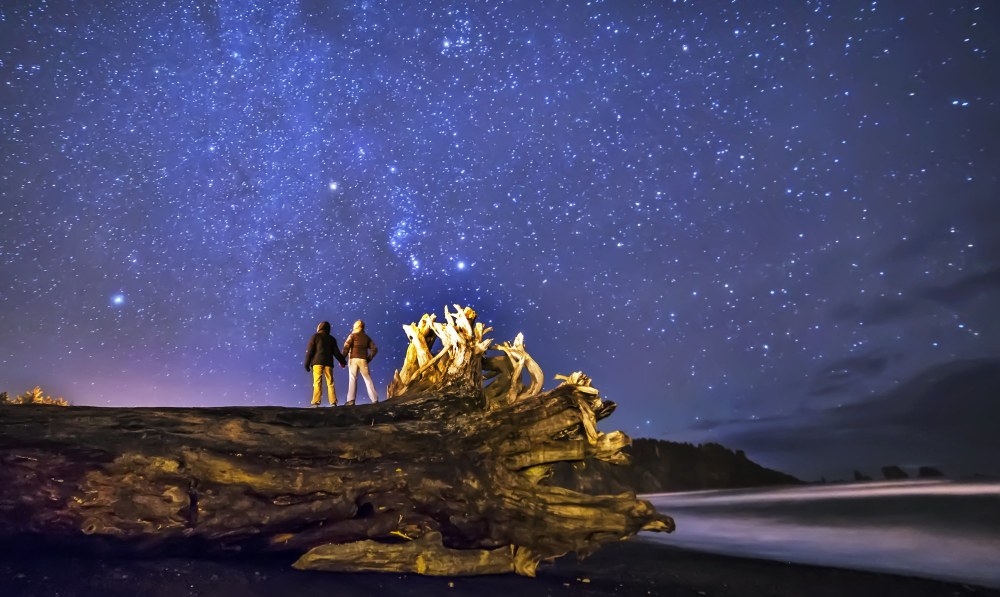
An American Dipper does her dance on a rock on the bank of the Cowlitz River. High above, Mount Rainier shreds the winter clouds. This tiny bird and this looming massif are connected. They are awesome.
That phrase has come to sound bland and shopworn with misuse.
Too bad.
A sense of awe is in our genes. Awe connects us to the wider world. As a species, the awe we experience in the presence of nature produces feelings of well-being that we are moved to share. If there is altruism, an ethical path, it seems it can be triggered by a sense of awe, a sense that we are small motes in a vast universe.
From Marcus Aurelius to Henry Thoreau, from William James and John Muir to Carl Sagan and Charlie Brown, the great thinkers have grappled with a sense of awe. Awe led Muir into nature and public service. It led Sagan to share his passion for the billions and billions of stars in the universe.
We are moved by the transformative elation, the freedom that is evoked by the awe we feel for towering mountains beneath staggering skies. The sense of self shrinks and connections grow.
A few studies have found that after being presented with images of the natural world, people are more likely to feel empathy. People are more likely to see individuals as part of their community. We are even more likely to reach out and help another person.
But awe can have a dark side. Studies have also identified the negatives in awe. Tornados and earthquakes evoke awe too, but it is tinged with deep fear and a sense of powerlessness. Awesome things can kill. As Mount St. Helens smoke and ash swirled around those caught in its path, who embraced its grandeur?
The great builders of common purpose, of citizenship, of nation-building as well as the despots and dictators are aware of the power of awe to bind us.
Hence the construction of grand buildings, of towering edifices, of monuments and statues.
But those man-made constructs don’t sway us in the same way.
Percy B. Shelley wrote in his great poem about a long dead monarch, Ozymandias, “Look on my works ye mighty and despair.” Awe doesn’t evoke despair. In the end, that’s a feeling bound to ego, to hierarchy, to dominance. The next lines reveal that. “Nothing beside remains. Boundless and bare, the lone level sands stretch far away.”
Awe seems to conjure up something more lasting. The truly awesome thing is not the crumbling statue. The truly awesome thing is the boundless desert. Even as it also frightens us, awe creates what some call “the oceanic sense,” what others call oneness, or god.
Even the sublime movements of the tiny Dipper can open us to the reverberations between the infinite and the infinitesimal. We can see the universe in a grain of sand.
If we are lucky. If we find a way shake to off the accretions of pretense, of despair, of anger. When we take the time. When we acknowledge the terror that also lurks in that immensity.
Is there awe in our human endeavors? Do you feel a sense of awe in bonds that humanity has woven, the warp of citizenship, the weft of faith? Perhaps. The works we craft rightly pale next to the redwoods, the wind, the feather swirling in a river’s eddy. But because we feel awe, we try. We try to recreate it, to connect to it, to seek it. And that is a noble goal. Maybe even an awesome one.
I don’t know if all creatures feel that sense of awe. When I sit with my good dog on a beach on Lopez Island and watch the sun set it feels like a shared ritual. The shovelers and coots gather. The gulls drift together. The light fades. Are they struck by some simple sense of awe as the day darkens?
Many of you would say no, stop anthropomorphizing.
But if it is genetic, this ability to feel awe, where did it start? What confluence of traits and surroundings produced these first feelings?
We are close to the primordial ooze with these questions. We are close to the mountain open to the heavens. We are close to the dipper, who bobs on the rock as she shifts her perspective to spot the dragonfly larvae moving over stones in the raging river. When she plunges into the icy water, is she immersed too, in some infinitesimal way, in a sense of awe?
This article originally appeared in our spring 2017 issue of Mountaineer Magazine. To view the original article in magazine form and read more stories from our publication, click here.
 Steven Scher
Steven Scher